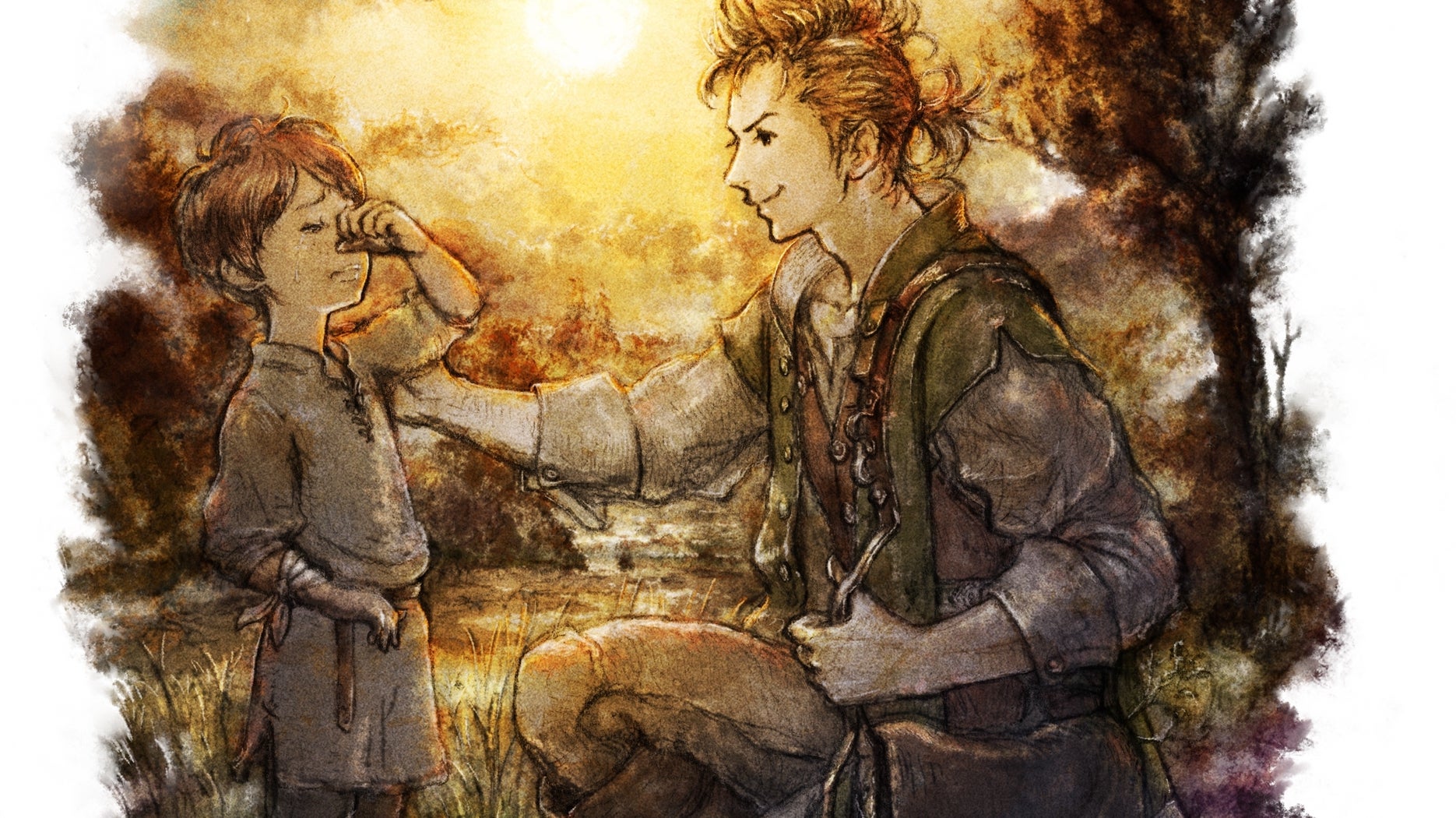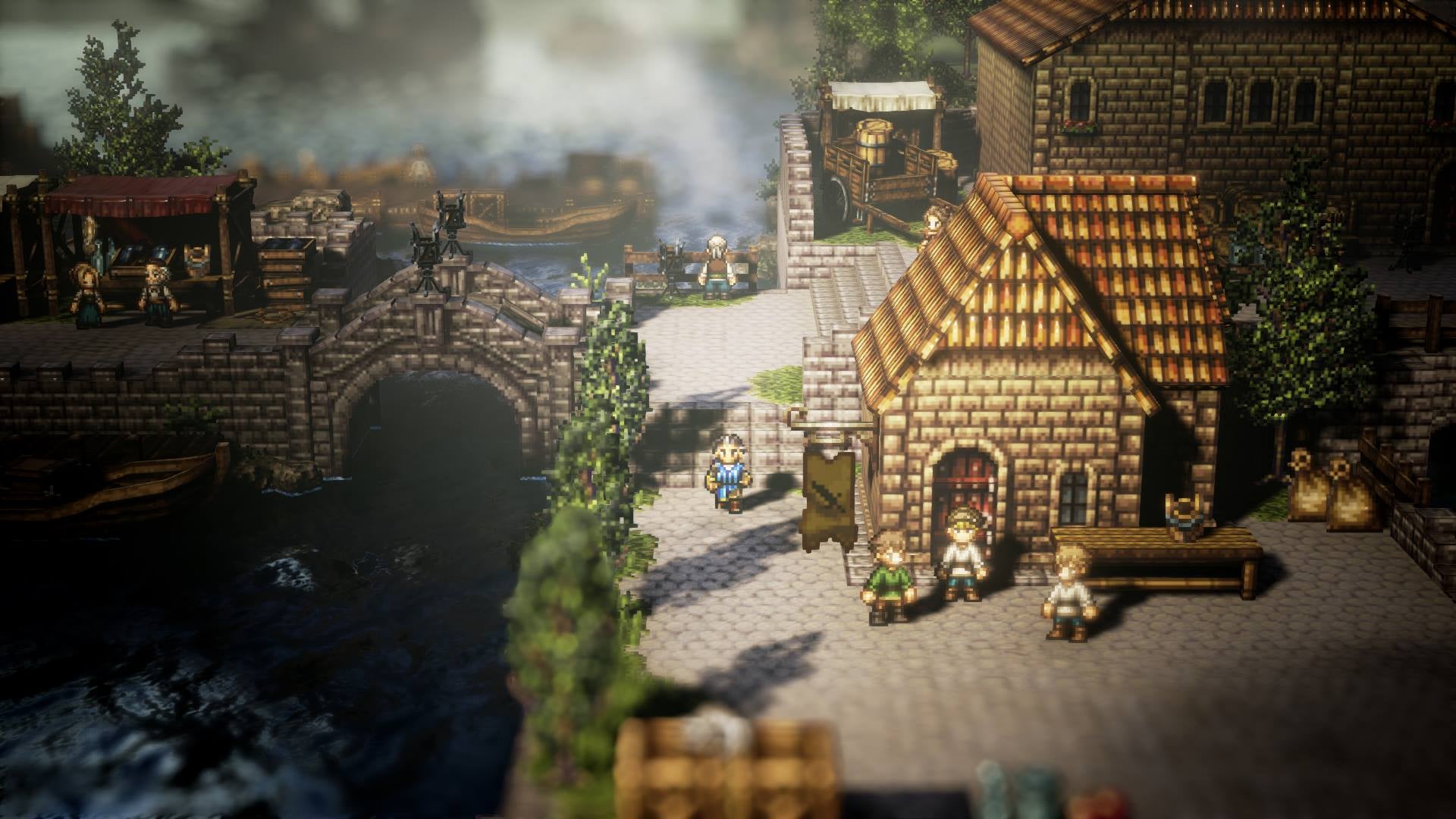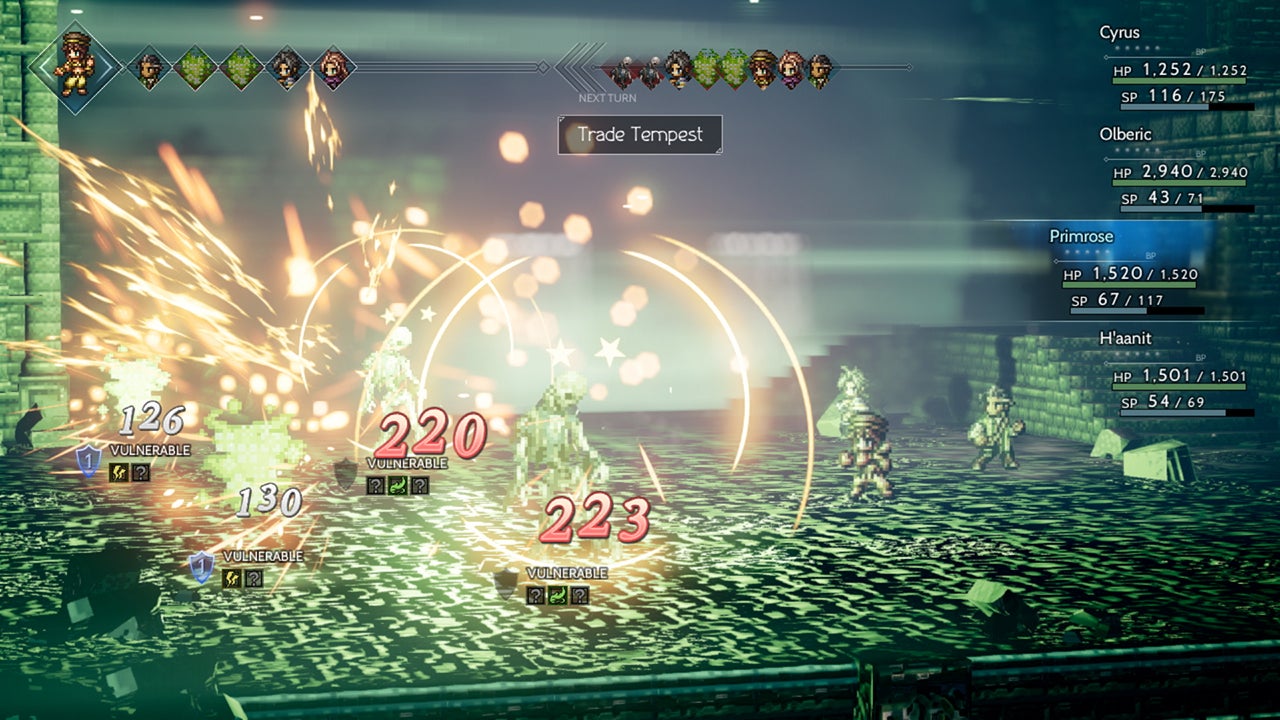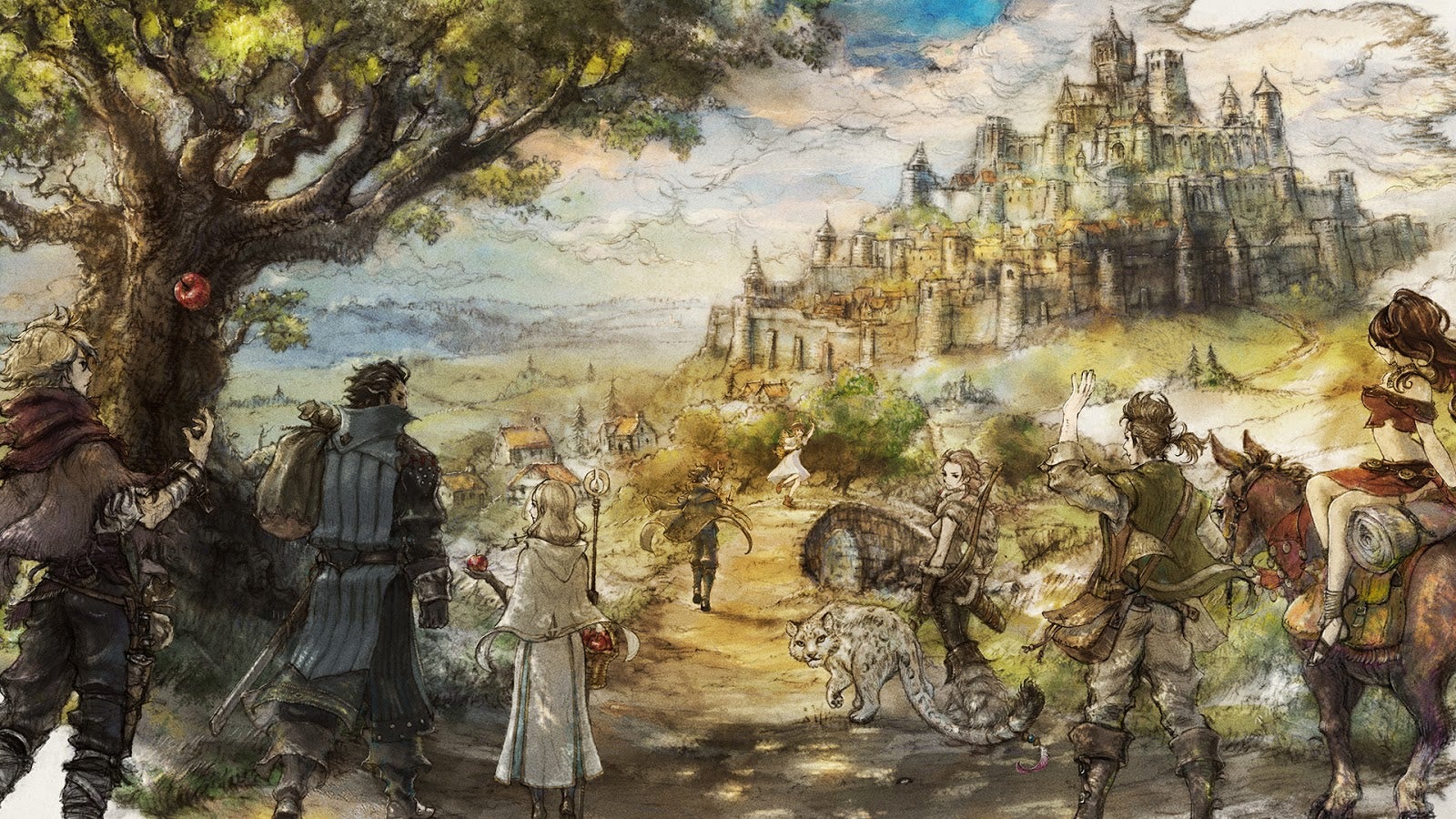Make More Switch Profiles to Continue Playing Octopath
'We just created the game that we wanted to play as Japanese developers'
The Octopath less travelled - inside the making of the Switch's big summer game.

Growing up in Naha, Okinawa, Masashi Takahashi fell in love with games, even if he was too young to properly play them. Sitting watching his two big brothers before he was able to properly read, Takahashi patiently watched them play through Final Fantasy 3, lending a hand whenever he could. "They were there to explain a lot of things - they described difficult words to me like 'chaos', like 'holy power'. These kinds of words I couldn't understand by myself, so they helped, and it was fun to watch them playing."
It was an experience shared by an entire generation. Over in Kanagawa, young Yasunori Nishiki, only a month younger than Takahashi, would also watch his older brother play through Square's series, beginning with Final Fantasy 4 - "When I discovered that Kain had betrayed another character, it was a big shock!" he says - and the two have found themselves, all these years later, trying to rekindle some of that same magic, Takahashi in a producer role for the forthcoming RPG Octopath Traveler, Nishiki as its composer.
Octopath Traveler is a delicious reimagining of 16-bit era RPGs, told by Square Enix alongside core developers Acquire with detailed 2D pixel-art that combines with 3D dioramas that ape that same aesthetic, providing a new spin on an old favourite. For Square Enix's Takahashi, it's about recapturing a little of what's been lost.

"With [today's] actual hardware, there's no limitation regarding expressing yourself with graphics," he says. "You can do whatever you think, whatever you want, and it's a big difference. In the Super Famicom era, people tried to get to the limits of their hardware, and what they did was the limits of what they could do. And we enjoyed the games, because beyond those limits we tried to imagine what they couldn't express directly on the screen. We tried to make a game that brings us back to that time, when we needed to imagine situations, emotions, but with a new-looking graphical aspect."
"You might ask yourself what's nostalgic about the music in Octopath Traveler," adds composer Nishiki. "But if you listen carefully, it's in the melody. They're melodies that are like old school RPGs. The modern part, of course, is to have a recording with a live orchestra. With those two points, I'm hoping to be keeping nostalgic melodies through this fuller sound."
Octopath Traveler didn't come from nowhere, of course. Before it there were the classics - Square's own SaGa series, the earlier Final Fantasy games and Dragon Quest to name but a few - but also a brace of more modern games in the shape of Bravely Default, another effort to rekindle some of that magic of the 16-bit era. They were curious games, developed at first solely for the Japanese market before interest from overseas led to an expanded edition launching worldwide a year after the original release.
"You might have noticed that at one point Square Enix tried to make games for the whole world - not just for the Japanese market. We tried to make global games for everyone. On the opposite side, though, with Bravely Default - we really thought it'd just be for Japanese people. But when it was released, Nintendo got in touch and said many players outside of Japan would like to play the game. So what could we do? Together we released a game, even though at first we had no intention of selling it outside of Japan. Finally, it did well! The sales were good outside of Japan.

"That's when I realised that we had no need to try and fit to the tendencies of western users. I discovered that, I'm Japanese, and with Octopath Traveler we just wanted to make a game we'd like ourselves, and if we like the game maybe western people would also play this game. When we started development of Octopath, we decided that it'd be a worldwide release. We didn't put in any features for western gamers, though - we just created the game that we wanted to play as Japanese developers."
It's certainly proved successful, going from the feedback from the two demos released thus far at least - there were some 1.5 million downloads of the first which released last September, and feedback was rolled into the final product, with improvements to the speed of the character's movement, the mini-map and the vignetting effect that is now optional. "What's funny is that the feedback we received from Japan and outside Japan, it was almost the same," says Takahashi. "Everyone told us this particular part is no good, that this part is fun - it was really nice for us, and it gave us the certitude that our games could have success worldwide."
It's a notion that somewhat skewers that strange division that still lingers in the minds of players between JRPGs and western RPGs - one that baffles Takahashi. "To tell the truth, to us JRPG doesn't mean anything!" he says. "Because if we're Japanese and we create an RPG, it becomes a Japanese RPG, you know? So for us every RPG is a Japanese RPG - but the name JRPG comes from outside Japan. It's your point of view - the western gamer's point of view - that made this genre exist. It's difficult to explain what a Japanese RPG is, because we're a JRPG, but Final Fantasy 15 is also a JRPG - they're quite different styles."
It's a very different game too, of course, because of its host platform - Octopath Traveler was built with the Switch in mind, announced alongside the console's big reveal last January and in development as Nintendo's hybrid found phenomenal success. "There's two reasons for Switch," explains Takahashi. "We already had experience with Nintendo with Bravely Default, and we'd decided to have Octopath as a worldwide experience. When we had to search for a partner for that, we had real confidence in Nintendo for that. And it's an RPG - that means you have to play a long time, and because our target audience was adults - like us - it's hard for us to be seated on the sofa for so long. Our lifestyle, you want to play in bed before you sleep for an hour.

"When we started to make Octopath Traveler, the Switch wasn't ready! It was just a prototype - we didn't know that much about the hardware. We just started because we wanted to make an RPG for a handheld system, but we didn't really know what hardware it was going to be.
"No-one could imagine the Switch becoming such a phenomenon - it was new hardware. At first, people were like 'are you sure, it's new hardware, it's risky...' But we trusted that if we made a great game players would follow us into our trial."
Square Enix is quickly coming around to the idea of the Switch, with more projects in the planning. As for Takahashi's own department, the relatively freshly-minted Business Division 11, it's easy to think they're going to be Switch specialists from now on, but that's not necessarily the case.
"As you may know at first the team was just the Bravely Default team, it was just a development team and not a division," says Takahashi. "But because the game did well and sold well we became a special division. Yes, we worked on Octopath Traveler and we're working on Switch titles, but that doesn't mean we're only working on Switch titles."
As for the future of Octopath Traveler, Takahashi has already announced - to some jubilation from fans - that there won't be any DLC coming for the game. "We really want the first concept we sell at full price to be 100 per cent of the game," he says - something in stark, almost pointed contrast to the way Final Fantasy 15 was dealt with elsewhere within Square Enix - "so there won't be any DLC in the future. As for Octopath as a series, it depends on the sales - if the players like the game it could be an opportunity, yes. But it's still not out yet, so we'll see!"
And as for the future of Takahashi and his division at Square Enix? The aesthetic that he's minted alongside Acquire has been so celebrated you can't help but wonder where it'll head next - and whether it'll ever find itself attached to the Final Fantasy name that so inspired it.
"To tell the truth I've no intention and no wish to go back to the Final Fantasy franchise. After my studio became a division, and Square told us to make new IPs. There's no need and no intention to go back to Final Fantasy. A lot of people ask us to do a remake of Final Fantasy 6 with this kind of graphics. My role, though, is to make new ideas," Takahashi says as our brief time together with him and composer Nishiki comes to an end, before he brings it back to where it all began. "I hope that people who enjoy RPGs will grow up with their kids, and be able to pass that on."
Source: https://www.eurogamer.net/we-just-created-the-game-that-we-wanted-to-play-as-japanese-developers
Postar um comentário for "Make More Switch Profiles to Continue Playing Octopath"